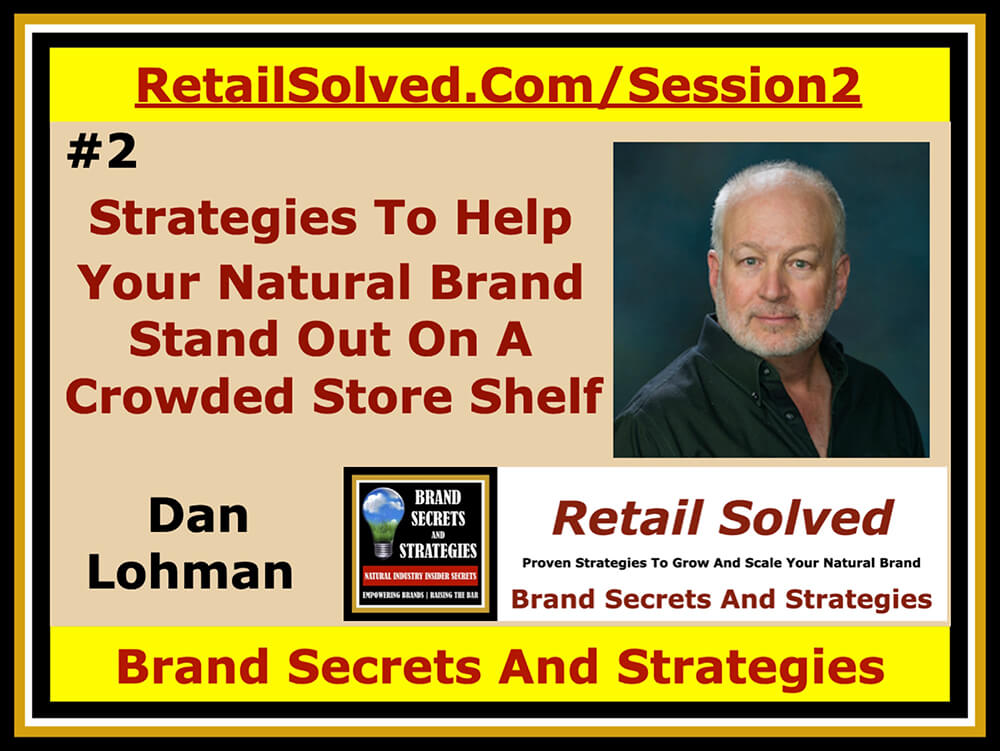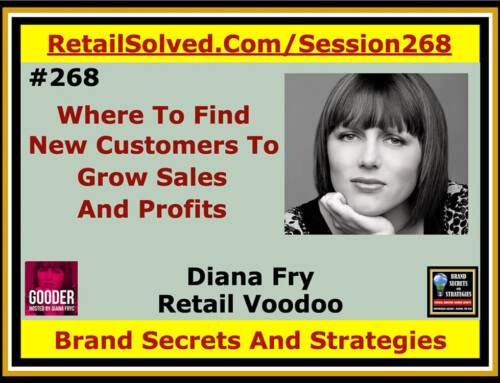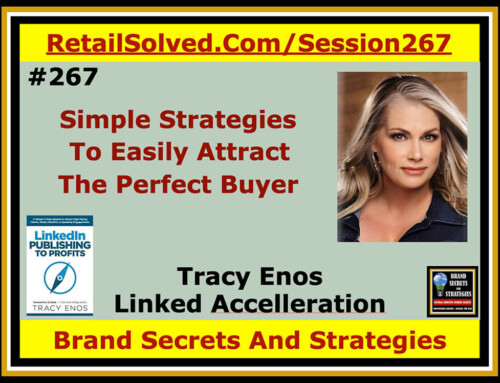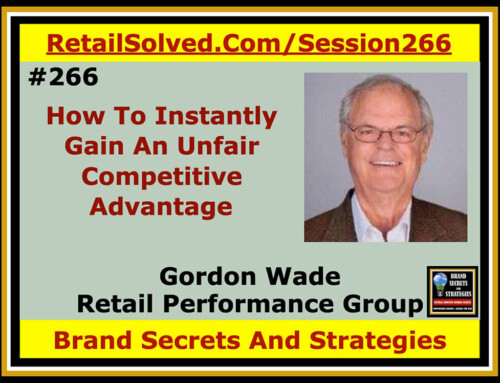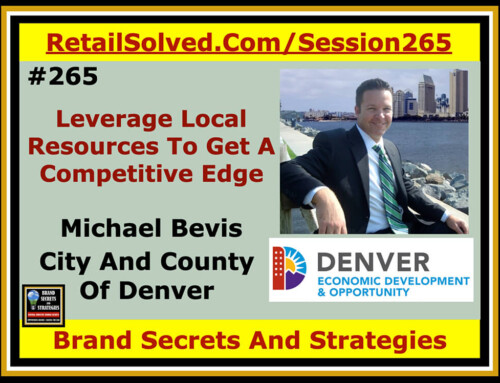Thank you for joining me for the second episode of the Brands Secrets and Strategies podcasts. Today we are going to slow things down a bit and begin unpacking some of the key concepts and strategies that will be the theme of much of the shows going forward.
I first want to talk about the brand retailer relationship. Today the retailers have the power, what I mean by that is, there is an illusion that brands need retailers more than retailers need brands, this is simply not true. You have been told for years now that price is the only thing that motivates shoppers to buy your products. You continually hear experts go on and on about how price is the only thing that drives sales at retail. This is not true, not even close, if it were true then luxury brands and decadent products would not be growing in sales. The truth is that quality matters more than price, value matters more than price, healthy, clean label natural organic products matter. They play an important row in any retailer’s strategy.
This is why I want to challenge the premise that retailers have all of the power. In other words, they need you as much as you need them. This is evidenced in the value of the core natural shopper and why they are so important to retailers, especially mainstream retailers. This is why mainstream brands are looking to acquire natural brands. They want to tap into that power to attract quality shoppers who will spend a premium to buy the ‘better for you’ products. This is also why local clean label, farm to table, organic and products that support important causes, are so popular. The bottom line is shoppers want to feel good about the products they buy. The committed natural shopper reads labels, they know what they are putting into their bodies, they understand the ingredients, probably far better than the people who work at the store. They understand how that product meets their nutritional goal and how that product is going to help benefit them and their family.
Download the rest of the show notes below
BRAND SECRETS AND STRATEGIES PODCAST #2 Strategies to help your natural organic brand stand out on a crowded retailer's shelf Hello and thank you for joining us today. This is the Brand Secrets and Strategies Podcast #2 Welcome to the Brand Secrets and Strategies podcast where the focus is on empowering brands and raising the bar. I’m your host Dan Lohman. This weekly show is dedicated to getting your brand on the shelf and keeping it there. Get ready to learn actionable insights and strategic solutions to grow your brand and save you valuable time and money. LETS ROLL UP OUR SLEEVES AND GET STARTED! Thank you for joining me for the second episode of the Brands Secrets and Strategies podcasts. Today we are going to slow things down a bit and begin unpacking some of the key concepts and strategies that will be the theme of much of the shows going forward. I first want to talk about the brand retailer relationship. Today the retailers have the power. What I mean by that is, there is an illusion that brands need retailers more than retailers need brands. This is simply not true. You have been told for years now that price is the only thing that motivates shoppers to buy your products. You continually hear experts go on and on about how price is the only thing that drives sales at retail. This is not true, not even close, if it were true then luxury brands and decadent products would not be growing in sales. The truth is that quality matters more than price, value matters more than price, healthy, clean label natural organic products matter. They play an important role in any retailer’s strategy. This is why I want to challenge the premise that retailers have all of the power. In other words, they need you as much as you need them. This is evidenced in the value of the core natural shopper and why they are so important to retailers, especially mainstream retailers. This is why mainstream brands are looking to acquire natural brands. They want to tap into that power to attract quality shoppers who will spend a premium to buy the ‘better for you’ products. This is also why local clean label, farm to table, organic products that support important causes, are so popular. The bottom line is shoppers want to feel good about the products they buy. The committed natural shopper reads labels, they know what they are putting into their bodies, they understand the ingredients, probably far better than the people who work at the store. They understand how that product meets their nutritional goals and how that product is going to help benefit them and their family. Remember the old saying, ‘you are what you eat’? It’s these core natural shoppers that are actually driving that conversation. This is why that core natural shopper is so very important to the mainstream retailers and the mainstream brands. Not only are they responsible for driving more traffic into retailer stores, they are also responsible for driving profitable sales in every category across every channel. This is the key to why so many mainstream brands are seeking to purchase natural brands. They are trying to tap into that core consumer and understand how that core consumer is driving sales. The challenge is, and we will get to this more in later shows, that the mainstream retailer and the mainstream brands tend to commoditize the natural consumer. They don’t really understand what makes natural - natural. This is the strength of natural retailers and has been at the core of everything they do. They understand their consumers far better than mainstream retailers. This is why natural retailers will continue to thrive in any economy in any market as long as they are smart and they are more strategic. Natural retailers need to work closely with their natural brand partners to take advantage of these strategies, the strategies that we cover in this Podcast, my articles and in my talks. They need to work closely together to help remain competitive and remain laser-focused on their core consumer. Now back to the retailer brand relationship. Consider this: retailers generically, don’t make anything, they sell other people’s products. What they sell is real estate. Their goal is to maximize the amount of space, every square inch of space, that your brand occupies on their shelf. There are two ways to do this. One, to increase the margin of your brand on the shelf. Two, to drive more traffic into their stores. They have to do this while battling with their competitors in their market and on-line. This is why they need you. They need natural brands that can help them drive those profitable shoppers into their stores…shoppers that buy your products. Before we go any further, there are two key concepts that I want to cover. The first one: shared wallet. As consumers begin to put together their shopping list they think about what their budget is. For example, if a consumer has a $400 monthly budget, that means they only have $400 to spend on everything for their list. The goal of the retailer is to try to get the consumer to buy as many of the products on their list in their store, without inviting them to go to their competitor's stores. The other key concept is market basket. Market basket is the value of all of the items in the consumer’s market basket as they check out of the store. The reason this is important is because this is the value of that customer to that retailer. The goal here is to try to get the consumer to spend more while they are in the store. There are a couple different ways of doing that. The first is to get them to buy things that they hadn’t planned on buying, like impulse items, and the second and the most important way of doing it is getting the customer to trade up. To trade up to things that are more expensive. Let me explain. A customer who walks into the store and buys organic bread is going to spend more than the customer who walks into the store and doesn’t buy organic bread. Therefore, the customer is trading up to buy a more expensive item. Now the reason this is so important is because the consumer who buys organic bread is probably going to buy an organic spread, organic dairy, organic produce or other premium products throughout the store. As a result, their market basket is higher than your average consumer. That makes this consumer more valuable to the retailer. This is why natural brands are so valuable to every retailer. Natural brands need to work closely with their retail partners. They need to leverage their strength and become leaders in their categories. Remember, retailers want to sell more products. They want to increase their margin in all of the categories across their entire store. They want more foot traffic. This is their core focus. This is where natural brands can help retailers drive sustainable sales in every category and help them compete more effectively. Savvy retailers appreciate this, they know this. They need your help, they want and need to work with natural brands that are capable of helping them drive profitable sales in their stores. This is why natural brands need to pay attention to this podcast. They need to read my articles and they need to become more strategic. This is how natural brands stand out on the shelf and in their category. This is how natural brands avoid becoming an ATM machine, and they avoid having big brands control their destiny. They decide when they go on the shelf, when they are promoted, etc. This is the opportunity for natural brands to step up and grab an equal seat at the table, an equal seat with big brands. Leveling the playing field by empowering brands and raising the bar is what this show is all about. I want to switch gears a little bit and focus on how natural brands can help retailers. Every brand knows that innovation is the key to growth. The challenge is, that a lot of the big brands will change a label, maybe change a flavoring or an ingredient and call that true innovation, which it is not. Consumers are aware of this. Consumers are looking for true innovation, meaning new products, new trends, things that better meet their needs. The reason natural is so important to retail is that the traditional natural brand is much closer to their core consumer than their mainstream counterparts. The reason this is important is because natural brands are innovating based upon what their consumers are asking for. They are making products that their shoppers want and need. Shoppers want what they want. The number one reason products fail is because the product did not meet the shopper’s needs. Transparency is key, especially to the natural organic core consumer. To these consumers, transparency is more than just a cheap slogan. Transparency to these consumers mean being able to understand not only what is in the product, but where it is produced and how it is produced. Transparency to these consumers includes non-GMO, no chemicals, toxins or pesticides, organic, no additives or fillers and no preservatives. I know of one company that actually has cameras throughout their entire plant to show you how their product is produced. Another term you may have heard is ‘clean label’. Clean label includes products that are transparent, products that have ingredients that are easy to understand, with simple ingredients that are only found in nature. Consumers are seeking out healthier foods. The majority of consumers now eat healthier than at any other time before. Consumers are looking to their friends for information about healthy products. They do on-line research and look for fitness tips and recipes. Shoppers today are actively choosing better options. They want products that promote health. Some consumers are actually looking for healthy products to reduce their dependency on prescription medications. That includes removing allergy triggers, products that cause inflammation and so on. We continually hear people talk about the importance of the millennial shopper, they are important but let’s not overlook the boomers. The boomers are driving all of the key health trends. For example, fiber, antioxidants, vitamin D, calcium, whole grains, protein and so on. Natural products continue to gain popularity. Consumers today want no artificial colors, no artificial flavors, reduced sugar, reduced fat. etc.. Years ago, we were taught that you had to shop the outside of the store and avoid the center of the store if you want healthy options. That’s not true today. A lot of healthy products that you can find today are found within the center of the store. But, the key to getting people or consumers to the center of the store is to focus on other areas like, produce, dairy, meat, etc. It is those categories that drive sales into the center of the store. Over the last several years, while category sales for all outlets are up, category sales for natural, organic and GMO Free are up even more. Retailers today are continually being bombarded by new healthy products. Products with different claims like non-GMO free, organic, etc. The key is for the natural brands to step-up, take a leadership role in the category and help the retailers to discern which healthy or ingredient trends they should be focused on. Shoppers have a lot of choices today, if the shopper can’t find what they want in your store, they can simply go elsewhere. The key is to have all of the products on the shelf that customers want. And we haven’t begun to talk about the threat from on-line retailers. There is an opportunity for natural brands and natural retailers to partner together to help keep consumers coming into their store. The conversation should be more about the shopper journey and helping that shopper find all of the products that they want and need. A couple of years ago, I wrote an article that was featured in the 2016 Category Management Handbook. I’ll place a link to the article in my show notes. The data that I used for the article was provided by Nielson, it was all outlet data. What was interesting about it is that I was able to take a total store and remove natural and healthy, organic, non-GMO and plant based. My research for the article supported a hunch that I had. Natural organic products were responsible for driving all sustainable growth in every category. Let me explain. If you consider total store sales, they are up 1.9%, natural products are up 11%, organic is up 16.9% and non-GMO’s up 15.8%. If you remove that little sliver of products that are sold as natural, organic or non-GMO, total store sales are flat or declining in every category. The reason this is important is that organic products represent just a small sliver of the products that are sold. So, let me drive this point home. Total US dairy sales are up 1.5%, while total natural organic sales are up 12.1%. Natural organic dairy sales represent only 9.8% of total US food sales, that’s several billion dollars’ worth of sales. Total dairy sales without natural organic are only up 0.5%, in other words that 9.8% of the category, is driving all of the sales in dairy. I’ll let you look at the article for all of the proper sourcing information and all the background that I used to support my findings. So, why does this matter? There is a lot of confusion about how to handle or how to sell our merchandise, natural organic products. Some retailers have what they call a store within a store. I don’t like this idea and I think it is a really bad strategy because it forces the consumer to shop one part of the store separate from the main part of the store. Consumers often overlook the natural organic alternatives or options if they are forced to go on a scavenger hunt for the healthier products. I recommend an integrated set or segregated set. This means putting the natural organics in the same set as their mainstream counterparts. This is key because consumers want to make the choices themselves. If a consumer picks up a loaf of bread and it is the best bread and best brand on the shelf, and let’s say it is $4.50, then they pick up a loaf of organic bread which is whole grain, etc., and that loaf of bread might be an extra $0.10 or $0.15. The consumer can then judge for themselves if that extra price is worth paying a few cents more. One of the things that I think natural organic brands fail to do is really to highlight the fact that their product satiates the consumer better than products that are full of processed food. What I mean by this, using the bread example, if you buy the cheap generic bread you are hungry within an hour. If you eat the really good mainstream bread that is processed, you might be hungry within a couple of hours. If you eat the natural organic bread, you might find yourself satiated longer. The point here is that you are what you eat and if you eat the products that best fuel and support your nutritional needs you are going to remain full longer. Some retailers put their natural organic products next to their mainstream counterpoint products but yet in a strip on a different section. Again, I don’t think this is the best solution, I think the best solution for merchandising healthy or organic, better-for-you products, is to put them right next to their mainstream counterparts. This gives the consumer the opportunity to make the choices that are best for them and best for their family. Remember, shoppers want what they want and they want an easy store that is friendly and easy to shop. They want to find the products that are on their list and they want to make their own choices. Natural brands today rely heavily on what I would call relationship selling. Most brands rely on retailers to merchandize and sell their products. This is a huge mistake. Retailers cannot possibly be experts on every item they sell and every category. Retailers are not the expert on how your consumer will shop your products, retailers want and need your help. Savvy retailers appreciate brands willing and able to help them drive sustainable sales in their categories. For this reason, the new strategy that I want to recommend is ‘fact based selling’. Fact based selling is true category management. Brands need to take an active role in every aspect of their sales and their success. Brands need to be fully prepared to support retailers to help them sell their products. Brands need to take an active role in how their products are sold, where they are sold and how they are merchandised, when they are promoted, how they are priced, etc. Brands should use every selling opportunity to educate their retail partners about the category, who shops the category, how they shop the category, etc. They also need to help the retailer understand who their competitor is and how their store compares to the competitor. Retailers need to collaborate with brands and provide effective category management support. To recap, my recommendations to grow natural product sales are to merchandise natural products next to top selling mainstream items and to leverage your category management capabilities at retail. Remember if you want to BE at this level, you need to play at this level. Manufacturers need to apply both product and consumer expertise to help support the retailer who sells their product. Both manufacturers and retailers need to form a collaborate, cohesive relationship to help each of them to grow and remain competitive. This can be accomplished by natural brands taking a leadership role in the category and stepping up. Natural brands need and deserve an equal seat at the table with the retailers. Savvy retailers will value and appreciate a brand’s expertise and possibly reward them with better shelf placement in an incremental promotional opportunity. Remember, the goal is to increase foot traffic at retail and the size of the consumer shopping basket. Brands need to adopt KPI’s, Key Performance Indicators, which are micro strategies that help build your brand consistently across all channels. These strategies include: pricing, promotion, distribution, merchandising, etc. Your KPI’s should measure your strategies against your competitor and they should be evaluated and score carded on a regular basis. We are going to talk about this in other episodes. Take an active role in helping your broker and distributor manage and grow your business. Develop a score card to hold them accountable for your success and your growth. Again, education. I cannot stress this enough. Commit to develop your category management, sales management, trade marketing management team by teaching them the best strategy to help you grow your brand sustainably. That is what this show is about. Brands need to become experts in their categories and in their competition. They need to understand what is driving category sales. They need to develop strategies that are going to help the retailer meet the needs of their consumer, your consumer. You need to know your customer. Natural consumers don’t simply want to be sold to. They are perhaps the most loyal consumers any retailer can hope to have. They are typically the most committed and best educated, meaning they read labels and read them carefully and are the most loyal and most dedicated shoppers across any channel. In addition to this, you need to be able to leverage your data and your analytics to maximize it for your brand and win the shelf. Again, that is what this show is all about. Thank you for listening today, please subscribe to the show and share it with your friends and every brand is looking for sustainable, competitive advantage. Please leave a review on Itunes and a comment on my web site. Stay tuned and keep coming back for more great business building tips along with more actionable insights and strategic solutions to grow your brand and to save you valuable time and money. This podcast will continue to grow and evolve over time. I have several guests lined up. Remember I will include a link to the 2016 Category Management Handbook in the show notes. In the first episode, I mentioned that I had a free gift for you just for listening, I will make it available on the show notes for this show as well. Retail management math is critical for you to do your job, but if you struggle, remember the key formula, text retail math to “44222” to get my free retail math cheat sheet. You can also claim it along with today’s show notes, BrandsecretsandStrategies.com/session2. I look forward to seeing you at future shows. This episode's FREE downloadable guide Each of us needs to perform basic retail math calculations but it's not always possible to remember every formula, especially if you don't use them on a regular basis. Here's a quick cheat sheet with some of the most important formulas you need to know. CLICK HERE TO DOWNLOAD YOUR FREE STRATEGIC GUIDE: Retail Math Cheat Sheet Thanks again for joining us today. Make sure to stop over at brandsecretsandstrategies.com for the show notes along with more great brand building articles and resources. Please subscribe to the podcast, leave a review, and recommend it to your friends and colleagues. Sign up today on my website so you don’t miss out on actionable insights and strategic solutions to grow your brand and save you valuable time and money. I appreciate all the positive feedback. Keep your suggestions coming. Until next time, this is Dan Lohman with Brand Secrets and Strategies, where the focus is on empowering brands and raising the bar. Enter your name and email address below and I'll send you periodic updates about the podcast. Sign up to receive email updates
Listen where you get your podcast
Like what you’ve heard? Please leave a review on iTunes
FREE Trade Promotion ROI Calculator:
Click Here To Maximize Sales And Profits
Free brand-building resources to help you grow and scale
Turnkey Sales Story Strategies FREE ON-DEMAND COURSE
Why Most Brands Fail – The Roadmap To Sales Success FREE ON-DEMAND COURSE
Essential In-Store Customers First Marketing Strategies FREE ON-DEMAND COURSE
How To Drive Profits With Sustainable Packaging FREE ON-DEMAND COURSE
The Retail Game – What You Need To Know With Bob Burke FREE ON-DEMAND COURSE
Sales Success Begins With A Solid Business Plan FREE ON-DEMAND COURSE
How To Turn Your OnLine Data Into Explosive Sales Growth FREE ON-DEMAND COURSE
2016 Category Management Handbook Page 20 & 21
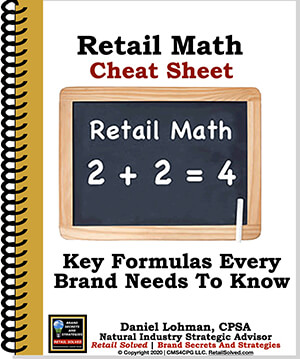
Want A Retail Math Cheat Sheet?
Each of us needs to perform basic retail math calculations but it’s not always possible to remember every formula, especially if you don’t use them on a regular basis. Here’s a quick cheat sheet with some of the most important formulas you need to know.
Empowering Brands | Raising The Bar
Ever wish you just had a roadmap? Well, now you do!
Don’t miss out on all of these FREE RESOURCES (strategic downloadable guides, podcast episodes, list of questions you need to be asking, and know the answers to, the weekly newsletter, articles, and tips of the week. You will also receive access to quick and easy online courses that teach you how to get your brand on the shelf, expand distribution, understand what retailers REALLY want, and address your most pressing challenges and questions.
All tools that you can use, AT NO CHARGE TO YOU, to save you valuable time and money and grow your sales today!
Image is the property of CMS4CPG LLC, distribution or reproduction is expressively prohibited.

